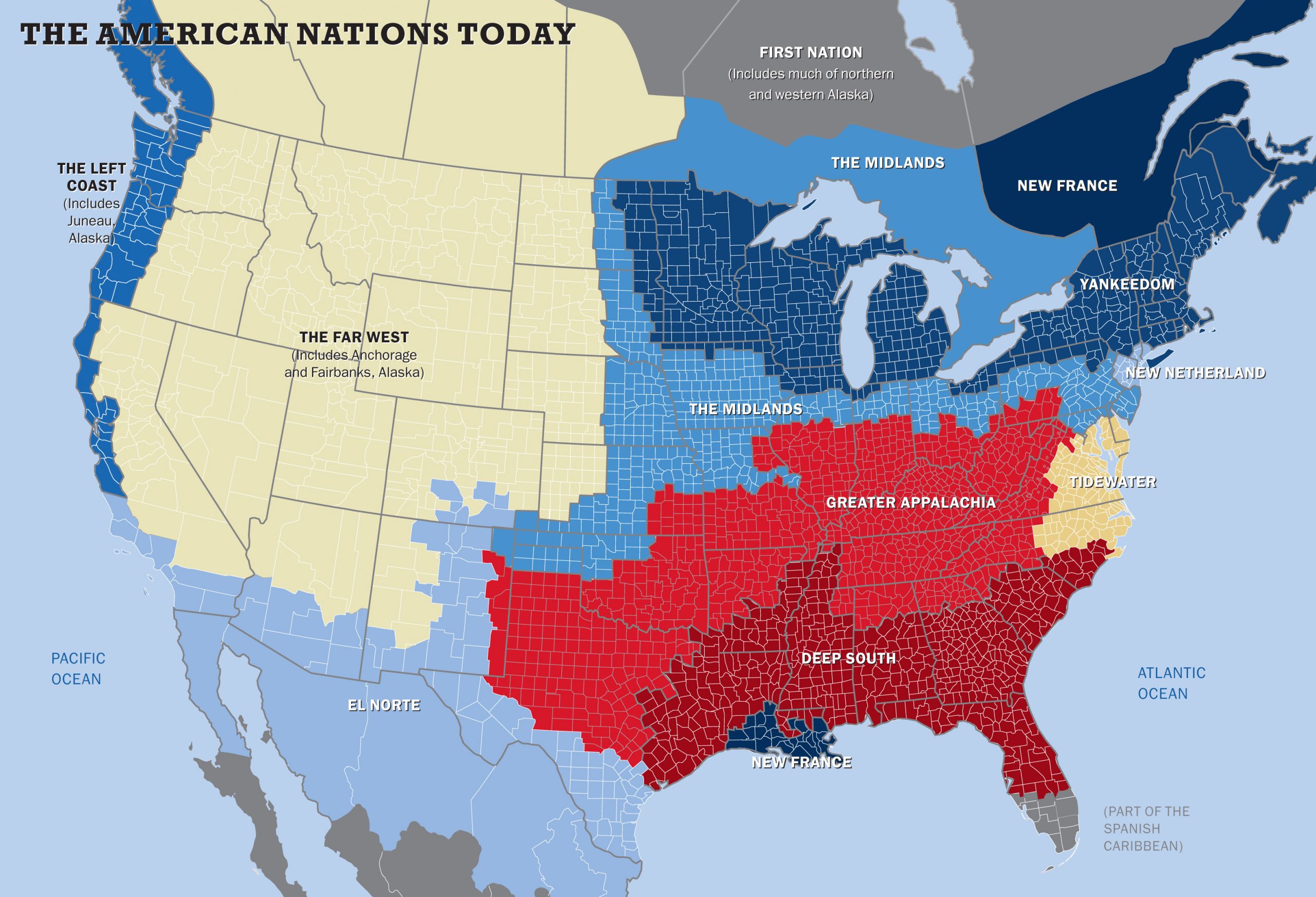
are two:
1) It’s militarily indefensible
2) Not controlling the lower Mississippi or another ocean port, it has no way to get its product out.
This ‘American nations’ map from Tuft’s Magazine should look familiar to long-time readers. Joel Garreau wrote a book back in the 1970s called “The Nine Nations of North America” in which he posited that culturally, the US of A was anything but united: there were nine distinct cultural “nations” within its borders. Since then, plenty of commentators have wondered to what extent those cultures will influence a proposed balkanization of America into separate nations (call it USA v 3.0*) in the future. Tuft’s Magazine’s county-by-county illustration – in which the authors expand the number of “nations” to 11 – uses a similar approach to talk about cultural differences in violence and approaches to gun control.
But as a map of cultures it’s still misleading: the differences between Dearborn, Detroit, and Houghton, Michigan, are far greater than between the Tidelands and the Deep South or between Yankeedom and The Midlands. We have a whole slew of what might be called microcultures, many too small to map, but even more distinguishing than the differences noted above.
They loom larger as well, because we no longer expect there to arise any synthesis between them and the macro American culture.** That’s an unavoidable byproduct of our modern, multicultural ideology. A century ago, the ideology of the day was that every day and in every way we’re getting more and more American, even as what it meant to be an American changed over time. That’s simply not the case any more except among immigrant populations, and only a small minority of them. Modern American multiculturalists certainly don’t expect Salvadoran or Sardinian immigrants to celebrate Flag Day or even to learn English.
For obvious reasons, such an approach results in growing numbers of microcultures increasingly isolated from the surrounding majority. But if culture is important, then multiculturalism is necessarily a devolutionary and destructive ideology because it’s impossible for people of very different cultures to live peacefully together over the long term.*** So we can look forward to a future of increasing cultural isolation and occasionally violent struggle, with the map growing more and more granular.
Such a change doesn’t mean 4GW sits upon our doorstep. If Mr. Lind is to be believed, the necessary and sufficient cause we are missing is something to replace America as our collective primary loyalty. In the Middle East and North Africa, Islam and its various divisions demand primary loyalty. But neither denomination**** nor states nor regions nor races***** are in any such position here.
Not yet anyway. I’ve long been of the opinion that no such thing will happen so long as the dollar retains any semblance of value. After all, a fed and entertained population is not one longing to go to war with itself. So at least for the medium term, we’ll muddle along hating those Yanks or Rebs or granolas just as we have always done.
In the long term, however, the number of “nations” will continue to grow. And how long they will remain one country is anyone’s guess.
* We are on v2.35 presently, but it’s a bit buggy and is still based on 1860s-era technology.
** As crappy as it is at present. But that’s a separate issue altogether.
*** Well, maybe it’s not impossible, it’s just never happened.
**** Baptists are not even content to remain Baptist, or at least the flavor of Baptist they were raised. They are pretty unlikely to start suicide bombing Catholic churches any time soon.
***** There’s plenty of flag-stomping and “America is racist” crap being tossed about, to be sure. But it’s a tantrum, not a change in primary loyalty. #BaltimoreRiot marchers don’t want to leave America, they want America to give them something.










4.5
In general,I agree with the map, but really, it is probably a bit too simplistic. Of coruse, your overall point is dead on right.
5
Too large on that map. Do those of us in that region get along alright? Sure.
Midwestern nationalism…someday…we get everything between the Ohio and the Missouri. (We’ll figure out western PA and NY later, maybe we’ll just take up to the watershed on the Appalachia) Three ways out for products. Most likely down the Mississippi to a friendly (or at least not openly hostile like towards the East) Southland. Or ship it west and let it find its way out. Or off to the frozen North because we get the Great Lakes.
Your point on the states and old divisions no longer holding together is extremely true and one that is a personal pain. Hoosierdom itself can be split into at least four divisions that I am aware of. The fact of being a Hoosier anymore…little pride there and certainly not enough to motivate most into fighting for it. A more basic level will be the bond…something that is sadly more primal and therefore much more bloody.
A healthy future nation does need to be defensible but it also needs to be as self sufficient as possible
Autarky is the way to got here. Trade is a luxury we may to deal without much of for the foreseeable future and while choosing it as an option is not pleasant, its better to choose it and have some control than to have it chosen for you by collapse or someone else’s trade regime imposed for their benefit
This action will necessitate a lower tech, less trade and export future for everyone. Materially less rich but spiritually and culturally better off.